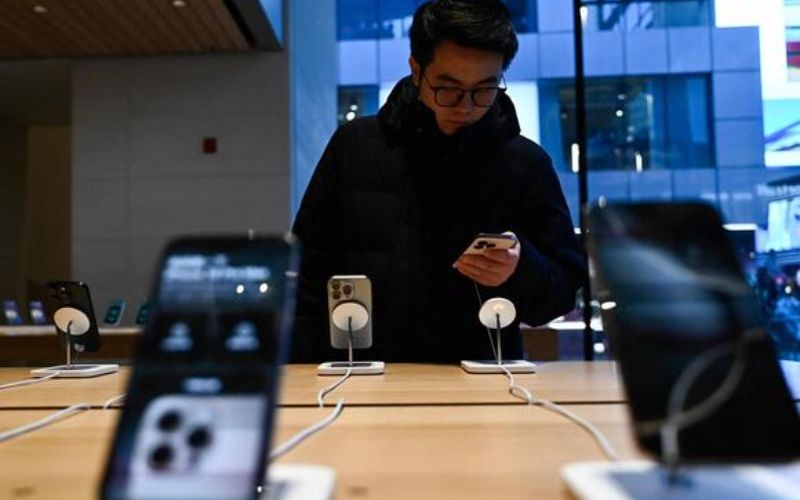Apple Drops UK Encryption Over Spying Demands

Apple’s choice to drag its Progressed Information Assurance (ADP) from the UK has started critical talk about and concern among security advocates, tech devotees, and ordinary clients. This move comes in reaction to the UK government’s requests for backdoor access to scrambled information, an ask that has far-reaching suggestions for client security and information security.
The Background
Apple’s ADP, presented in late 2022, offers end-to-end encryption for a wide run of iCloud information, counting reinforcements, photographs, notes, and more. This level of encryption guarantees that, as it were, the client can get to their information; indeed, Apple cannot unscramble it. The highlight was seen as a noteworthy step forward in ensuring client security in an age where information breaches and cyber dangers are progressively common.

However, the UK government’s request for backdoor access to this scrambled information has constrained Apple to create a troublesome choice. The government issued a “specialized capability take note” beneath the Investigatory Powers Act (IPA) of 2016, frequently alluded to as the “Snooper’s Constitution” by critics. This takes note of compels companies to supply get-to-scrambled information when required for law authorization purposes.
Apple’s Response
In reaction to this request, Apple reported that it would now not offer the ADP feature to modern clients within the UK, and existing clients would in the long run cripple it. This choice implies that iCloud reinforcements within the UK will not have end-to-end encryption, permitting Apple to get to client information on the off chance that lawfully compelled.
Apple communicated its disillusionment in an explanation, highlighting the significance of end-to-end eprotectingn in ensuring client information from cyber dangers and breaches. The company repeated its commitment to client security and security, expressing that it would never construct a backdoor into its items or administrations.
Implications for Users
The removal of the ADP includes critical suggestions for UK clients. Without end-to-end encryption, iCloud reinforcements are more powerless to unauthorized access, whether by programmers or government organizations. This alter influences a wide extent of information, counting photographs, messages, and other delicate data put away in iCloud.
For numerous clients, the comfort of cloud reinforcements is fundamental. Putting away information exclusively on gadgets is unreasonable for those with expansive photo collections, broad informing histories, or frequent gadget updates. In any case, without the assurance of end-to-end encryption, this information is presently more available to third parties.
The Broader Debate

The debate over encryption and government access to data is not new. Governments argue that access to encrypted data is crucial for national security and crime prevention. They contend that strong encryption can hinder law enforcement efforts to investigate and prevent criminal activities.
On the other hand, protection advocates and tech companies contend that making backdoors for government get-to debilitates by and large security. Once a backdoor exists, it can be misused by pernicious performing artists, putting all clients at risk. They emphasize that solid encryption is basic for securing client protection and keeping up belief in computerized services.
The Future of Encryption
Apple’s choice to drag the ADP highlight from the UK highlights the progressing pressure between security and security. As governments proceed to thrust for more prominent access to scrambled information, tech companies confront troublesome choices in adjusting client security with legitimate compliance.
Currently, UK clients should weigh the dangers and benefits of using iCloud without end-to-end encryption. Apple has expressed that it remains committed to promoting the most elevated level of security for user data and hopes to reintroduce the ADP included within the UK in the future.
Also Read:
- Substack: Monetize & Publish Videos Directly in-App
- Microsoft Unveils Majorana 1 Quantum Chip Breakthrough
Meanwhile, clients can take extra steps to secure their data, such as utilizing solid passwords, empowering two-factor verification, and being cautious about the data they store within the cloud. Whereas the evacuation of the ADP highlight may be a mishap for security advocates, it moreover serves as a reminder of the significance of staying careful in ensuring individual information.
Conclusion
Apple’s decision to remove its Progressed Information Security highlights from the UK may be a noteworthy improvement within the continuous talk about encryption and government access to information. Whereas the move is a reaction to legitimate requests, it underscores tech companies’ challenges in adjusting client security with compliance. As the talk proceeds, clients must stay educated and proactive in securing their information in an progressively computerized world.






